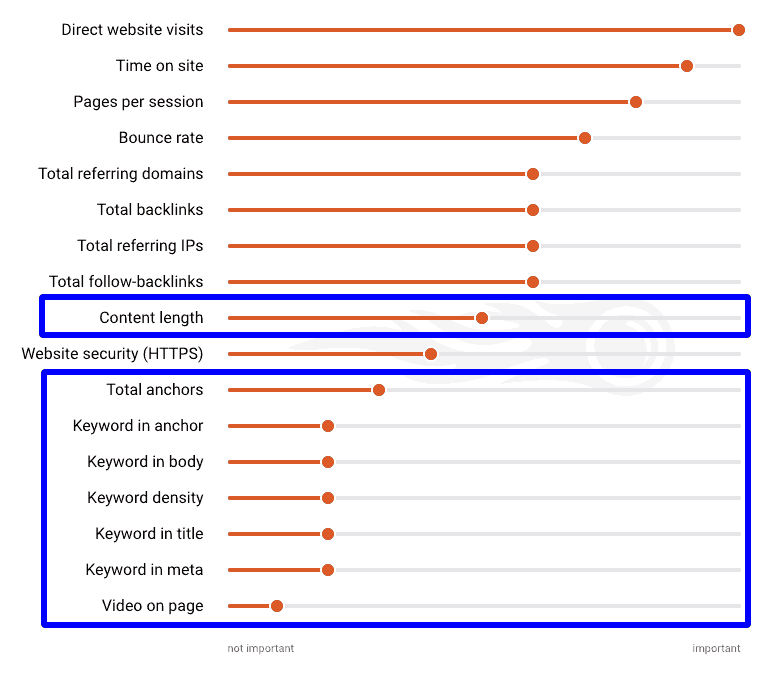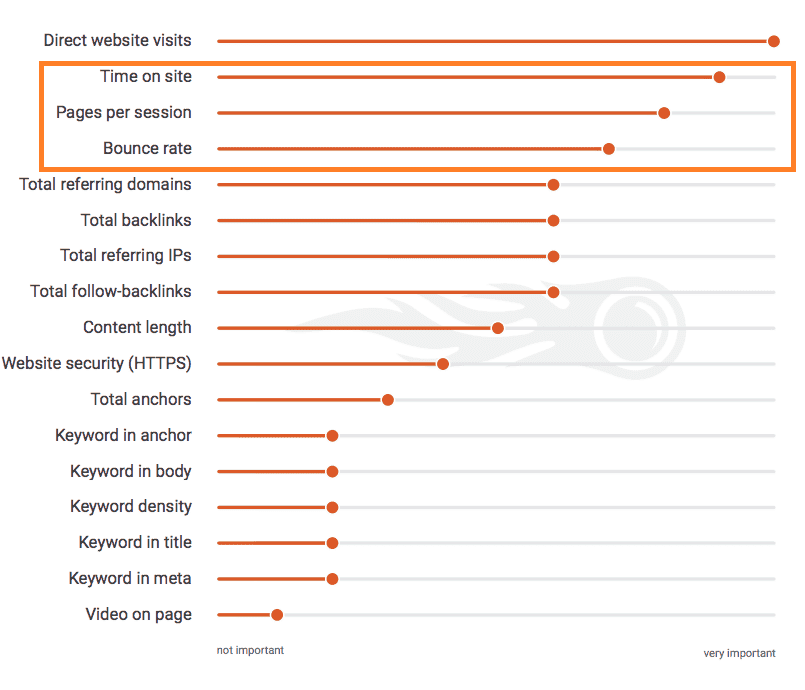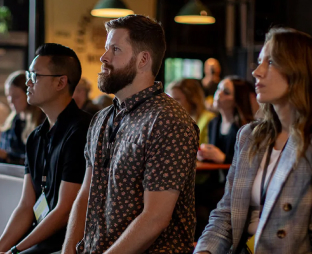On-page SEO is the process of planning, designing, building and continuously improving your web pages and content with the goal of increasing your rankings in the search engine results pages (SERPs).
While Off-Page SEO deals with marketing activities that take place away from your website, on-page SEO focuses on the elements of your own website design and content that impact your ability to rank.
Without a comprehensive understanding of On-page SEO, digital marketers run the risk of publishing content that’s doomed to fail on the SERPs – regardless of how much value it provides to readers.
In this essential guide, we’re giving a complete overview of on-page SEO optimization, why it’s important, and how it differs from other forms of search engine optimization. You’ll also find a handy list of the most important on-page SEO elements and a few tips to help you start optimizing your own pages.
[optin-inline id=’brn9po57oncrzzuabw0m’]
Why is On-Page SEO Important?
How important is On-page SEO exactly?
The Ranking Factors 2.0 study conducted by SEMrush analyzed data on over 600,000 keywords to identify the most important ranking factors used by the Google Search algorithm. In the following graphic, which outlines some of their findings from the study, we’ve enclosed blue boxes around the elements that fall under On-Page SEO.

Image: SEMrush Most Prominant Ranking Factors 2.0 Study Results
These findings clearly demonstrate that on-page SEO factors are among the most important elements that search engines consider when ranking your pages in the SERPs. If your goal is to create amazing content that ranks well on search engines and drives plenty of free, organic traffic to your website, you probably won’t succeed without effective on-page SEO.
How Does On-Page SEO Work?
On-page SEO helps search engines understand what your website and content are all about, which enables them to index your pages as part of search engine results. Without effective on-page SEO, search engines will have a difficult time categorizing the content on your website and you’ll have difficulty ranking for any keywords that you’re targeting.
Let’s break down how a search engine like Google tries to rank your website to understand how On-Page SEO optimization makes an impact.
To create search results that connect users with information, products, and services on the Internet, Google goes through three basic steps:
- Crawling – Google uses Internet robots called crawlers to find new web pages on the Internet and monitor updates to websites that it already knows about.
- Indexing – Once a page is discovered, Google uses algorithms to understand what the page is about. This is done by analyzing the page contents and assets, including images and videos. All of this data is stored in the Google index, a massive database of all web pages that Google’s crawlers have found on the Internet.
- Ranking & Serving – When a user types a search query into the search engine, Google uses the data in the index to generate ranked search results. Google’s objective is always to connect searchers with useful information and resources that satisfy their search intent.
When indexing your website, Google tries to answer many different types of questions about your content:
- What is this content about?
- What search intentions can this content satisfy?
- How authoritative and trustworthy is this content?
- Was this content published by an individual or organization that can claim expertise in the subject matter?
- Are there images here that searchers would find useful?
- Are there videos or other media here that searchers would find useful?
As the author, publisher or marketer, you already know the answers to all of these questions. On-Page SEO is simply the process of ensuring that the correct answers to these questions are communicated by your web page directly to search engine crawlers so your content can be properly indexed and given the rankings that it deserves.
Which On-Page SEO Elements Have the Most Impact?
Keyword Targeting
Google relies heavily on keywords to determine the contents and subject matter of a web page during the indexing process. Every piece of content on your website should be optimized around a specific keyword to ensure that Google can index that page with an appropriate understanding of its contents and the value it provides to users.
When you structure a piece of content to target a specific keyword, you’re giving that page the best possible chance of appearing in search results when users type your keyword as part of their search query.
Search Intent Targeting
Google is increasingly moving away from keyword-specific targeting and towards ranking search results based on how they satisfy user intent. The four types of search intent recognized by Google are:
- Informational (Searching for knowledge and information)
- Navigational (Searching for a specific website)
- Commercial Investigation (Searching for product reviews and comparisons)
- Transaction (Purchasing intention, searching for something to buy)
Each page on your website should be optimized for a specific keyword and search intention.
Keyword Density & Related Keywords
Digital marketers have differing opinions on keyword density, which is essentially how frequently your target keyword should appear on the page.
Many digital marketers have tried to pin down the optimal keyword density for ranking on Google, which is usually agreed to be between 1-5%.
Here’s what we’d recommend:
- Incorporate natural mentions of your target keyword throughout your content, but don’t intentionally spam your keyword.
- Aim for 5-7 mentions of your target keyword per 1000 words of text. More is okay, but make sure you’re not being repetitive or spammy.
- To help avoid repetition, incorporate variations of your keyword throughout your content piece. Variations don’t count towards the total of 5-7 mentions per 1000 words, but again don’t spam.
Content Length
If you want your piece of content to rank higher than other similar pieces, a great starting point is to write something bigger, longer and better. From Google’s perspective, short articles are likely to be low-detail and provide minimal value to its users.
Writing long-form content like a free eBook on a specific topic or a highly authoritative guide demonstrates to search engines that you’re working hard to deliver real value for users. The average piece of content that ranks on the front page of Google is now 1,447 words long.
If you’re trying to rank for a specific keyword, it’s worthwhile to look up the top-ranking articles for your chosen keyword and copy them into a word processor to measure for yourself how long they are. Then you can try to beat them by publishing something even longer and more comprehensive.
URL
Including your target keyword in the URL of your page sends a strong signal about the contents of that page to search engines.
Title
Search engines like Google may display your title tags as clickable elements in your search results, so it’s important to optimize them. An optimized title tag has the following characteristics:
- 50-60 characters in length
- Contains the target keyword, ideally at the beginning of the title tag
- Is highly descriptive of the page content and its value
Crawlers use your title tag as a major indicator of the subject matter and theme of the page, so again it’s crucial to optimize with your target keyword and include it near the beginning of your title tag.
Headers
Google crawlers read header tags to assess how information is categorized on a specific page. Effective use of headers also makes your page easier to navigate for human users. Here are some simple rules to follow:
- Headers should appear in the proper order on the page. H1 should appear at the top, with H2 headings appearing further down and sub-headings nested beneath headings as appropriate.
- Include your target keyword in your H1 header and in other headers on your web page.
Images & Alt Text
Images with descriptive file names and alt text can be included in Google image results, creating an additional source of traffic to your web page. Optimize your images and alt text by including your target keyword to make sure they appear in relevant search results for users.
Internal Links
Internal links play three important roles on your web pages:
- They help establish a content hierarchy on your website that funnels visitors to your most important pages
- They spread link equity around your website, helping every page on your website rank better
- They make your website easier to navigate and crawl for both users and search engines
The most important factor when it comes to internal linking is your anchor text. Whenever you create an internal link to a page on your website, do the following:
- Ensure that the anchor text contains the target keyword for the target page
- Ensure that the anchor text is 3-5 words at maximum
- Ensure that the link is contextually relevant to the user when encountered
Outgoing Links
Having outgoing links from your website to other authority sites in your niche has been shown to positively impact your rankings in the SERPs.
E-A-T & Authorship
During the indexing process, Google tries to determine the level of expertise, authoritativeness and trustworthiness that can be attributed to a given article. There are a few ways that you can use on-page SEO to help Google see you as an expert:
- Use authorship attribution so Google knows who wrote the piece
- Construct author bios for contributors on your website that link to their social media and LinkedIn profiles
- Stay in your lane and write content that reflects your genuine expertise. If you’re not a doctor, don’t give medical advice. If you’re not a lawyer, don’t give legal advice.
User Experience
Optimizing for user experience includes elements of technical and on-page SEO optimization. The three major user experience factors that Google accounts for are time on site, pages per session, and bounce rate. As you can see in the diagram below, these are some of the most important ranking factors that determine the performance of your website in the SERPs.

Image: SEMrush Ranking Factors 2.0 User Experience Factors
Google captures user experience information by collecting data directly through the Google Chrome browser. Anytime someone visits your website on Google Chrome, Google knows exactly how much time they spent on your website and how many pages they navigated to before leaving – and these are two of the most important factors determining how your website ranks in the SERPs.
User experience connects back to having great on-page SEO optimization and making sure that your content is genuinely valuable for users. If you’re ranking for search terms that have nothing to do with the contents of your page, users who click on your results will find your pages irrelevant. That means a high bounce rate, poor user experience and an eventual drop in rankings.
Poor page loading times can also negatively impact users, especially by causing them to leave your page before your content even loads. You can use the free PageSpeed Insights tool by Google to diagnose and fix problems that may be causing your web pages to load slowly.
Summary
Thanks for reading our essential guide for On-Page SEO optimization!
Now that you understand the important role that on-page SEO plays in Google search rankings, we hope you’ll incorporate these tips into your own content marketing strategy and see your web pages climb in the search engine rankings.
Need additional support in your SEO efforts? Get in touch with our renowned SaaS SEO agency to begin dominating the SERPs.
-
 CEO
Garrett Mehrguth
CEO
Garrett Mehrguth
Did you enjoy this article?
Share it with someone!
